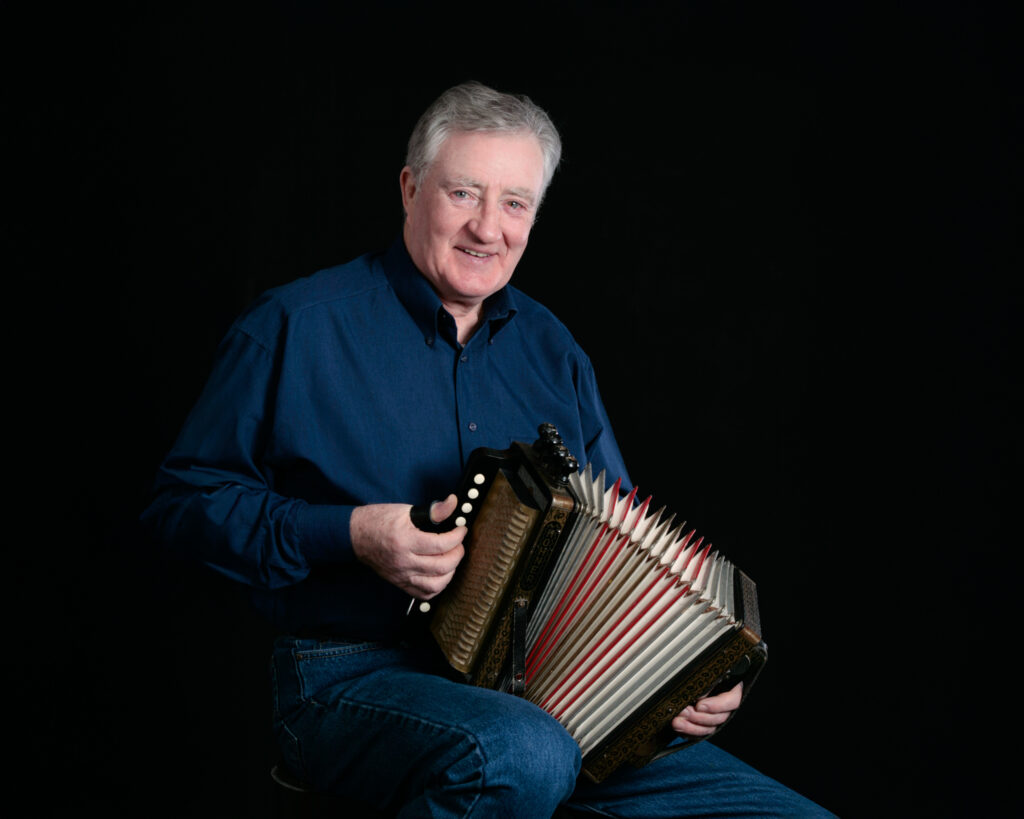
Murdo MacDonald (1947-2024), known affectionately as “Wasp” or “Murchadh Dhol” in his native Lewis, embodied the rich tradition of Gaelic song and music. Born in Lower Shader on the west coast of Lewis, he grew up immersed in a vibrant musical heritage. Both his parents were accomplished singers, and his Martin uncles, from Back, were known for their skills with the button box, pipes, and mouth organ. His uncle Ailig (Fraolaig) was also a composer of Gaelic songs, some of which Murdo would later record.
From age seven, Murdo taught himself the melodeon, later progressing to the button accordion, though he never abandoned his beloved Hohner melodeon, which would be the last instrument he played. His musical style was deeply rooted in the traditional Gaelic singing of his home area, influenced by countless informal gatherings, village hall cèilidhs, and the cultural exchanges of the bothan. Besides his traditional singing and distinctive playing style, which made him a sought-after performer at local events, Murdo’s powerful baritone voice ensured his recruitment for some of the island’s Gaelic choirs, and for many years competed at National Mods, with Laxdale Gaelic Choir and Còisir an Taobh Siar.
A significant milestone came in 1989 when he won the Gold Medal for seann-nòs (old style) singing at the National Mòd in Stornoway. This televised triumph brought his talents to a wider audience, leading to performances across Scotland, England, and Ireland. He went on to record two albums of Gaelic songs, performed at the Edinburgh International Festival and appeared in numerous television programmes, including the Port series, Cuimhneachan (featuring Gaelic songs of World War I), and BBC Alba’s Hogmanay show.
Throughout his life, Murdo balanced his musical pursuits with practical work. A skilled joiner by trade, he later became a Housing Improvement Project Manager with Tighean Innse Gall. He was also a dedicated crofter, maintaining traditional farming practices and later sharing this knowledge with students at Sabhal Mòr Ostaig. His hands-on experience with horse and plough made him a valuable source of information about traditional Lewis crofting practices.
As a musician, he was a long-standing member of the Woodland’s Cèilidh Band and the Ness Melodeon Band, participating in cultural exchange trips and festivals. He particularly enjoyed playing music with his son Donnie, an accomplished guitarist and mandolin player, and helping young local singers and folk groups. His wide repertoire included songs from his uncle, Alec Martin, and local singers and composers such as Murchadh a’ Bhocs and Murda Sheumais; bringing their traditional songs to international audiences.
Following the loss of his wife Cathie in 2011, Murdo temporarily stepped away from music. However, fate intervened when a chance encounter with Gaelic singer, Margaret Stewart, led to a new and happy chapter in both their lives and renewed Murdo’s musical journey. They performed at many prestigious events including the Willie Clancy Summer School, the Blas Festival, the Rudolstadt Festival in Germany and represented Scotland at UNESCO’s Year of Indigenous Languages in Berlin. Together, they travelled widely, sharing their music, language and culture across Europe and the USA.
Murdo’s legacy lies not only in his recordings and performances but in his role as a guardian and transmitter of Gaelic culture. His unique voice, considered among the finest to emerge from Lewis, and his masterful button box playing, preserved and celebrated the authentic traditions of his island home. He also composed tunes, including “The Summer Isles Festival,” which became popular among musicians in the Achiltibuie area.
His passing in September, 2024 marked the loss of a true gentleman who served his language, music, and culture with dedication and humility. He is remembered not only for his extraordinary musical talents but for his gentle nature and willingness to share his deep knowledge of Gaelic tradition with future generations.